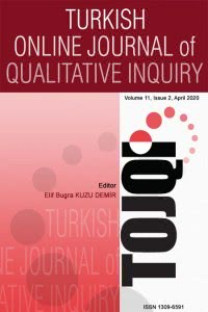The Implementation of Educational Projects in Social-action-based Learning
Sosyal-eylem-odaklı Öğrenmede Eğitimsel Projelerin Uygulaması
___
Acar, A. (2020a). Transforming communicative tasks into mini-projects. Elementary Education Online, 19 (3), 1660-1668. doi:10.17051/ilkonline.2020.734694Acar, A. (2020b). An analysis of the English textbook ‘let’s learn English’ in terms of the action-oriented approach. Turkish Studies - Education, 15(3), 1449-1458. https://dx.doi.org/10.29228/TurkishStudies.42832
Council of Europe (CoE). (2001). Common European framework of reference for languages: learning, teaching, assessment. Cambridge: Cambridge University Press.
Council of Europe (CoE). (2018). Common European framework of reference for languages: Learning, teaching, assessment. Companion volume with new descriptors. Retrieved from https://rm.coe.int/cefr-companion-volume-with-new-descriptors2018/1680787989.
Demirezen, M. (2011). The foundations of the communicative approach and three of its applications. Journal of Language and Linguistic Studies, 7(1), 57-71.
Ellis, R. (2003). Task-based language learning and teaching. Oxford: Oxford University Press.
Estaire, S., & Zanon, J. (1994). Planning classwork: A task-based approach. Oxford: Heinemann.
Hymes, D. (1972). On communicative competence. In J. Pride & J. Holmes, (Eds.), Sociolinguistics (pp. 269- 93). Harmondsworth: Penguin.
Kırkgöz, Y., Çelik, S., & Arıkan, A. (2016). Laying the theoretical and practical foundations for a new elementary English curriculum in Turkey: A procedural analysis. Kastamonu Eğitim Dergisi, 24(3), 1199-1212.
Milli Eğitim Bakanlığı, (MEB) [Turkish Ministry of National Education]. (2013). İlköğretim kurumları (ilkokullar ve ortaokullar) İngilizce dersi (2, 3, 4, 5, 6, 7 ve 8. sınıflar) öğretim programı [Primary education institutions (primary and secondary schools) English language teaching program (Grades 2-8)]. Ankara: T.C. Millî Eğitim Bakanlığı.
Milli Eğitim Bakanlığı ̧ (MEB) [Turkish Ministry of National Education]. (2018). İngilizce Dersi öğretim programı (ilkokul ve ortaokul 2,3,4,5,6,7 ve 8. sınıflar) [English language teaching program (primary and secondary schools grades 2,3,4,5,6,7 and 8)]. Ankara: T.C. Millî Eğitim Bakanlığı.
Nunan, D. (1989). Designing tasks for the communicative classroom. Cambridge: Cambridge University Press.
Piccardo, E., & North, B. (2019). The action-oriented approach: a dynamic vision of language education. Bristol: Multilingual Matters. DOI https://doi.org/10.21832/PICCAR4344
Prabhu, N. S. (1987). Second language pedagogy. Oxford: Oxford University Press.
Puren, C. (2002). Perspectives actionnelles et perspectives culturelles en didactique des langues-cultures: vers une perspective co-actionnelle co-culturelle. Retrieved from https://www.christianpuren.com/mes-travaux/2002b/
Puren, C. (2004). De l'approche par les tâches à la perspective co-actionnelle. Retrieved from https://www.christianpuren.com/mes-travaux/2004a/
Puren, C. (2006). De l’approche communicative à la perspective actionnelle. À propos de l’évolution parallèle des modèles d’innovation et de conception en didactique des langues-cultures et en management d’entreprise. Retrieved from https://www.christianpuren.com/mes-travaux/2006f/
Puren, C. (2009). La nouvelle perspective actionnelle et ses implications sur la conception des manuels de langue. Retrieved from https://www.christianpuren.com/mestravaux/2009g/
Puren, C. (2011). Mises au point de/sur la perspective actionnelle. Retrieved from file:///C:/Users/User/Downloads/PUREN_2011e_Mises_au_point_de_sur_PA%20(3 ).pdf
Puren, C. (2014a). Approche communicative et perspective actionnelle, deux organismes méthodologiques génétiquement opposés… et complémentaires. Retrieved from https://www.christianpuren.com/mes-travaux/2014a/
Puren, C. (2014b). La pédagogie de projet dans la mise en œuvre de la perspective actionnelle. Retrieved from https://www.christianpuren.com/mes-travaux/2014b/
Puren, C. (2014c) Différents niveaux de l’ « agir » en classe de langue-culture: corrigé du tp sur la notion de « compétence » Retrieved from file:///C:/Users/user/Downloads/054- 2_Niveaux_agir__notion_comp%C3%A9tence_corrig%C3%A9_TP.pdf
Puren, C. (2017). Opérations cognitives (proaction, métacognition, régulation) et activités fonda-mentales (rétroactions, évaluations) de la démarche de projet. Retrieved from https://www.christianpuren.com/mes-travaux/2017a/
Puren, C. (2019a). The stages of a project. Unpublished document.
Puren, C. (2019b). De la tâche finale au mini-projet: Un exemple concret d’analyse et de manipulation didactiques. Retrieved from file:///C:/Users/User/Downloads/PUREN_2019f_Tache_finale_a_miniprojet%20(1).pdf
Puren, C. (2020). From an internationalized communicative approach to contextualised plurimethodological approaches. Retrieved from https://www.christianpuren.com/mes-travaux/2020c-en/
Skehan, P. (1996). A framework for the implementation of task-based instruction. Applied Linguistics, 17, 38‒62. https://doi.org/10.1093/applin/17.1.38.
Van, Ek J.A. (1975). The threshold level. Strasbourg: Council of Europe.
Willis, J. (1996). A framework for task-based learning. Harlow: Longman.
Yeni-Palabiyik, P., & Daloğlu, A. (2016). English language teachers' implementation of curriculum with action-oriented approach in Turkish primary education classrooms. Journal on English Language Teaching, (6)2, 45- 57. https://doi.org/10.26634/jelt.6.2.5980
Zorba M.G., & Arıkan A., (2016). A study of Anatolian high schools’ 9th grade English language curriculum in relation to the CEFR. Uşak Üniversitesi Eğitim Araştırmaları Dergisi, 2(2), 13-24. https://doi.org/10.29065/usakead.232436
- ISSN: 1309-6591
- Yayın Aralığı: 4
- Başlangıç: 2010
- Yayıncı: Prof.Dr. Abdullah Kuzu
Sosyal-eylem-odaklı Öğrenmede Eğitimsel Projelerin Uygulaması
Bazı İlkokul Öğretim Programlarının Uluslararası Sosyal ve Duygusal Beceriler Açısından İncelenmesi
The Formation of Subjectivity in Asian Students in Japanese Higher Education
4. ve 5. Sınıf Sosyal Bilgiler Kitaplarında Yer Alan Ünite Değerlendirme Sorularının Analizi
Tekin ÇELİKKAYA, Mutlu KÜRÜMLÜOĞLU
Primary School Teacher Candidates' Experiences Regarding Problem-Based Stem Applications
Saime Şengül ANAGÜN, Engin KARAHAN, A. Zeynep KILIÇ
Sınıf Öğretmeni Adaylarının Probleme Dayalı STEM Uygulamalarına Yönelik Deneyimleri
